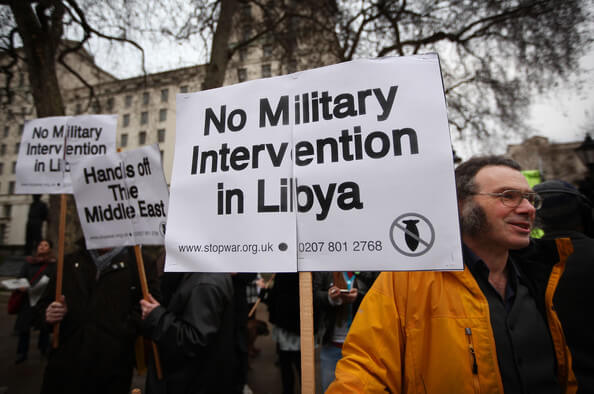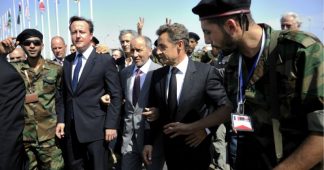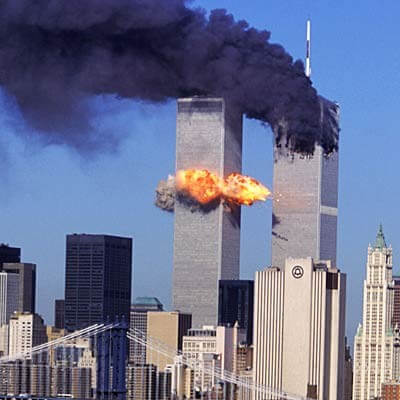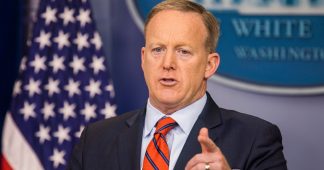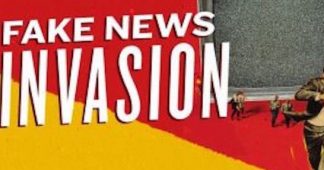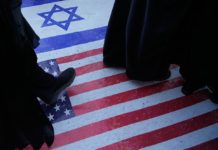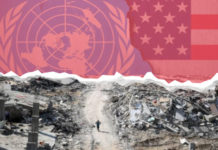Exclusive: In 2016, when a British parliamentary report demolished the excuse for the U.S. and its allies invading Libya in 2011, it should have been big news, but the U.S. mainstream media looked the other way, reports Joe Lauria.
By Joe Lauria
(Corrects to show that a Times story was published.)
In George Orwell’s 1949 dystopian novel 1984, the protagonist Winston Smith’s job was to delve into The Times of London archive and rewrite stories that could cause trouble for the totalitarian government ruling Britain. For instance, if the government made a prediction of wheat or automobile production in their five-year plan and that prediction did not come true, Winston would go into the archives and “correct” the numbers in the article on record.
In writing a response the other day to a critic of my recently published book on Hillary Clinton’s electoral defeat, I was researching how the U.S. corporate media covered a 2016 British parliamentary report on Libya that showed how then Secretary of State Clinton and other Western leaders lied about an impending genocide in Libya to justify their 2011 attack on that country.
Using a combination of different keywords, I searched The Washington Post archives but came up with no story on the parliamentary report at all. A search of The Los Angeles Times archives likewise came up empty.
The New York Times had a dispatch from London. But it laid the blame entirely on the British and French governments, as if the U.S. had nothing to do with the devastation of Libya on false pretenses. The U.S. gave the same false war rationale as the British and French did. But The New York Times never held U.S. officials to account for it.
Ignoring or downplaying a story is one way U.S. corporate media deliberately buries news critical of American foreign policy. It is often news vital for Americans to understand their government’s actions abroad, actions which could mean death or life for U.S. soldiers and countless civilians of other lands.
British newspapers widely covered the story. As did the International Edition of CNN, which has separate editors from CNN’s U.S. website. An online search found no domestic CNN story. There’s also no video online indicating that CNN domestic or CNN International television reported the story.
The Asia edition of The Wall Street Journal had a story. It’s not clear if it appeared in the U.S. edition. Newsweek ran a story online. But it does not mention the United States even once.
It is a black mark on the Congress’ two foreign affairs committees that neither undertook a similar inquiry (although congressional Republicans did obsess over the Sept. 11, 2012 attack on the U.S. consulate in Benghazi, which occurred about a year after the Obama administration facilitated the military overthrow and brutal murder of Libyan leader Muammar Gaddafi).
Voice of America, which broadcasts outside the United States, ran a story on its website about the British parliamentary report, though the article confined criticism of the U.S. to not being prepared for the aftermath, not for the intervention itself.
A thorough online search shows that The Nation magazine and several alternative news sites, including ConsortiumNews and Salon, appear to be the only U.S.-based media that accurately covered the blockbuster story that undermined the entire U.S. narrative for leaving Libya a failed state.
Rationale for an Attack
The United States peddled its false story of a coming genocide in Libya under the doctrine of Responsibility to Protect to justify military intervention. On its face R2P appears to be a rare instance of morality in foreign and military policy: a coalition of nations with U.N. Security Council authorization would take military action to stop an impending massacre. It would have been hard to argue against such a policy in Libya if indeed its genuine purpose was to stop a massacre, after which the military operation would withdraw.
But that is not where it ended. While arguing that intervention was necessary to stop a massacre in Libya, the real intent, as the British report says, was regime change. That’s not what American officials said at the outset and what corporate media reported.
“In the face of the world’s condemnation, [Libyan leader Moammar] Qadhafi chose to escalate his attacks, launching a military campaign against the Libyan people,” President Barack Obama told the nation on March 28, 2011. “Innocent people were targeted for killing. Hospitals and ambulances were attacked. Journalists were arrested, sexually assaulted and killed. … Cities and towns were shelled, mosques were destroyed, and apartment buildings reduced to rubble. Military jets and helicopter gunships were unleashed upon people who had no means to defend themselves against assaults from the air.”
Hillary Clinton, who according to leaked emails was the architect of the attack on Libya, said four days earlier: “When the Libyan people sought to realize their democratic aspirations, they were met by extreme violence from their own government.”
Sen. John Kerry, at the time chairman of the Senate Foreign Relations Committee, chimed in: “Time is running out for the Libyan people. The world needs to respond immediately.”
Mustafa Abdul Jalil, head of a transitional council that the U.S., U.K. and France recognized as the legitimate Libyan government, pleaded for a no-fly zone. The University of Pittsburgh–educated Jalil was playing the same game as Ahmed Chalabi had in Iraq. They both sought U.S. military might to bring them to power. He said that if Gaddafi’s forces reached Benghazi they would kill “half a million” people. “If there is no no-fly zone imposed on Qadhafi’s regime, and his ships are not checked, we will have a catastrophe in Libya.”
Report Tells a Different Story
And yet the summary of the September 2016 Foreign Affairs Committee report says: “We have seen no evidence that the UK Government carried out a proper analysis of the nature of the rebellion in Libya. … UK strategy was founded on erroneous assumptions and an incomplete understanding of the evidence.”
The report further said: “Despite his rhetoric, the proposition that Muammar Qadhafi would have ordered the massacre of civilians in Benghazi was not supported by the available evidence. While [he] certainly threatened violence against those who took up arms against his rule, this did not necessarily translate into a threat to everyone in Benghazi. In short, the scale of the threat to civilians was presented with unjustified certainty.”
The committee pointed out that Gaddafi’s forces had taken towns from rebels without attacking civilians. On March 17, two days before NATO’s assault began, Gaddafi told rebels in Benghazi to “throw away your weapons, exactly like your brothers in Ajdabiya and other places did. They laid down their arms and they are safe. We never pursued them at all.” The Libyan leader “also attempted to appease protesters in Benghazi with an offer of development aid before finally deploying troops,” the report said.
In another example, the report indicates that, after fighting in February and March in the city of Misrata, just one percent of people killed by the Libyan government were women or children. “The disparity between male and female casualties suggested that Qadhafi regime forces targeted male combatants in a civil war and did not indiscriminately attack civilians,” the report said.
How then could The New York Times and The Washington Post, the most influential American newspapers, either refuse to adequately cover or not cover at all a story of such magnitude, a story that should have been front page news for days? It was a story that undermined the U.S. government’s entire rationale for an unjustified attack that devastated a sovereign nation.
There can be only one reason the story was ignored: precisely because the report exposed a U.S. policy that led to a horrible crime that had to be covered up.
History Spiked
Defending U.S. policy appears to be the underlying motive of U.S. news coverage of the world. The Libya story is just one example. I’ve had personal experience of editors rejecting or changing stories because it would undermine U.S. foreign policy goals.
I twice pitched a story about a now declassified Defense Intelligence Agency document warning of the rise of a U.S.-backed Salafist principality in eastern Syria, intended to pressure Syrian President Bashar al-Assad, that could join with Iraqi extremists to become an “Islamic State,” two years before it happened. My story was twice rejected. It would have undermined the entire American narrative on the War on Terror.
On another occasion, I wrote several articles about the lead-up to a U.N. vote to grant Palestine Observer State status. In each article I mentioned that 130 countries already recognized Palestine as a state and many had diplomatic relations, including Palestinian embassies in their capitals. That essential fact in the story kept getting cut out.
Another story I wrote was spiked about the position Russia, Syria and Iran took on who was responsible for the chemical weapons attack outside Damascus in August 2013. The story also included an interview with a Congressman who demanded to see U.S. intelligence backing its accusation against Assad.
Telling both sides of a story is Journalism 101. But not evidently when the other side is a perceived enemy of the United States. There are only interests in international affairs, not morality. A journalist should not take sides. But American journalists routinely do in international reporting. They take the “American side” rather than neutrally laying out for the reader the complex clash of interests of nations involved in an international dispute.
Downplaying or omitting the adversary’s side of the story is a classic case of Americans explaining a foreign people to other Americans without giving a voice to those people, whether they be Russians, Palestinians, Syrians, Serbs, Iranians or North Koreans. Depriving a people of their voice dehumanizes them, making it easier to go to war against them.
One can only conclude that U.S. corporate media’s mission is not to tell all sides of an international story, or report news critical of U.S. foreign policy, but instead to push an agenda supporting U.S. interests abroad. That’s not journalism. That’s instead the job Winston Smith did.
* Joe Lauria is a veteran foreign-affairs journalist. He has written for the Boston Globe, the Sunday Times of London and the Wall Street Journal among other newspapers. He is the author of “How I Lost By Hillary Clinton” published by OR Books, from which part of this article was adapted. He can be reached at joelauria@gmail.com and followed on Twitter at @unjoe.
